Nestled in the heart of the countryside, Busy Bees Farm stands as a beacon of sustainable agriculture and environmental stewardship. Founded over a decade ago by the passionate apiarist duo, Sarah and Michael Thompson, the farm has grown from a small family venture into a thriving community-centered enterprise. The Thompsons’ mission is simple yet profound: to produce the highest quality honey while nurturing the environment and educating the public about the vital role of bees in our ecosystem.
Busy Bees Farm is distinguished by its unwavering commitment to sustainable practices. From the very beginning, Sarah and Michael have prioritized eco-friendly methods, such as organic farming and the use of natural pest control, to ensure that their bees thrive in a healthy and balanced environment. This dedication to sustainability extends beyond their beekeeping operations; the farm also champions renewable energy, utilizing solar panels to power their facilities and reduce their carbon footprint.
Community engagement is at the heart of Busy Bees Farm’s philosophy. The Thompsons believe that education is key to fostering a greater appreciation for bees and their essential contributions to biodiversity. To this end, they offer a range of interactive experiences for visitors, including guided tours, hands-on workshops, and educational programs for schools and local organizations. These initiatives not only enhance public understanding of apiculture but also inspire a new generation of environmental stewards.
What truly sets Busy Bees Farm apart is its holistic approach to beekeeping. Unlike many commercial honey producers, the farm prioritizes the well-being of its bees over profit margins. Each hive is meticulously managed to ensure the health and productivity of the colony, and the honey is harvested with utmost care to preserve its natural purity and flavor. Additionally, the farm’s unique bee-friendly gardens provide a diverse array of forage plants, supporting pollinator populations and promoting ecological balance.
In essence, Busy Bees Farm is more than just a honey producer; it is a testament to the harmonious coexistence of agriculture and nature. Through their dedication to sustainability, community involvement, and ethical beekeeping practices, Sarah and Michael Thompson have created a model that other farms can aspire to, making Busy Bees Farm a true leader in the field.
Establishing Busy Bees Farm was an endeavor grounded in meticulous planning and a deep understanding of apiculture. The first step was selecting a prime location, a decision influenced by several critical factors. We chose a site that offers ample sunlight, has good drainage, and is away from large bodies of water to minimize the risk of dampness, which can be detrimental to bee health. Additionally, the location is shielded from strong winds yet accessible enough to facilitate easy monitoring and maintenance.
Once the location was finalized, the next phase involved setting up the beehives. We opted for Langstroth hives due to their modular design, which simplifies hive management and honey extraction. Positioning the hives was done with care; they were placed facing southeast to capture the morning sun, which helps to warm the bees and promotes early foraging activities. Proper spacing between hives was also maintained to reduce the chances of disease transmission and minimize competition among bee colonies.
An essential aspect of our honey farm is the cultivation of a diverse array of flowers, specifically chosen for their attractiveness to bees and their role in supporting bee health. We planted an assortment of native wildflowers, including clover, sunflowers, and lavender. Clover is particularly beneficial as it blooms over an extended period, providing a consistent nectar source. Sunflowers, with their large, accessible blooms, are excellent for pollination, while lavender not only attracts bees with its fragrance but also has properties that help in deterring pests.
Creating a harmonious environment for the bees is paramount. We have taken measures to ensure the environment is free from pesticides and other harmful chemicals, as these can significantly impact bee health and productivity. The presence of diverse floral resources, combined with the strategic placement of hives, contributes to the overall well-being of our bee colonies, fostering a thriving and productive honey farm.
The transformation of nectar into honey is a remarkable process that stands as a testament to the ingenuity and diligence of bees. Worker bees play a pivotal role in this intricate journey. These industrious insects venture out from the hive, sometimes traveling up to five miles, in search of flowers rich in nectar. Using their proboscis, they extract the nectar and store it in a special stomach called the honey sac, which is separate from their digestive stomach.
Upon returning to the hive, the nectar-laden worker bees transfer their cargo to other worker bees through a process known as trophallaxis. This exchange allows for the addition of enzymes, which begin the transformation of nectar into honey. Inside the hive, the nectar undergoes further enzymatic activity and a reduction in moisture content. Worker bees fan the hive with their wings to aid in the evaporation process, which thickens the nectar into the viscous substance we know as honey.
The hive structure is crucial to this transformation. The hexagonal honeycomb cells, crafted from beeswax produced by the bees, provide an efficient storage system for the developing honey. The structure is not only space-efficient but also robust, capable of supporting significant weight. Each cell serves as a mini-vat where nectar is deposited, processed, and eventually sealed with a wax cap once it has reached the ideal consistency and moisture level.
Throughout this process, the natural wonders of bee behavior and hive dynamics become vividly apparent. The cooperation and communication among bees, the precise architectural skills, and the biochemical transformations all highlight the complexity and efficiency of this natural system. Each step, from nectar collection to honey storage, is essential for producing high-quality honey, underscoring the importance of preserving these vital pollinators and their habitats.
The honey harvesting process at Busy Bees Farm is a meticulous and rewarding endeavor that underscores our commitment to sustainable beekeeping. Our journey begins with the careful preparation of the hives, ensuring that the bees are treated with the utmost care and respect. We use specialized tools such as bee smokers, which emit a gentle smoke to calm the bees, allowing us to access the hive with minimal disturbance. This smoke triggers a feeding response in the bees, making them less aggressive and easier to handle.
Once the bees are calm, we proceed to remove the honeycomb frames from the hive. These frames are brimming with golden honey, a testament to the hard work of our diligent bees. We gently brush away any remaining bees on the frames and transport them to our extraction facility. Here, the cappings—waxy coverings sealing the honey in the comb—are carefully cut away using capping knives or forks.
The uncapped frames are then placed in a honey extractor, a centrifugal device that spins the frames, extracting the honey without damaging the comb. This method ensures that the comb can be returned to the hive to be reused by the bees, promoting sustainability. The extracted honey flows through filters to remove any residual wax or debris, ensuring a pure, high-quality product.
The joy and satisfaction of the harvest are palpable, as each jar of honey represents a harmonious collaboration between the farmers, the bees, and the environment. This connection is central to our philosophy at Busy Bees Farm, as we strive to foster a sustainable relationship with nature.
The honey produced at Busy Bees Farm boasts a variety of flavors and qualities, each influenced by the diverse flora surrounding our hives. From the light, delicate notes of clover honey to the robust, aromatic tones of wildflower honey, each batch offers a unique tasting experience. We invite you to savor and appreciate the fruits of this labor, knowing that every spoonful embodies the dedication and care that define our honey harvesting process.
Eating honey is beneficial to you in many ways. It helps your immune system, fights allergies, and it’s great for keeping your skin soft and supple.
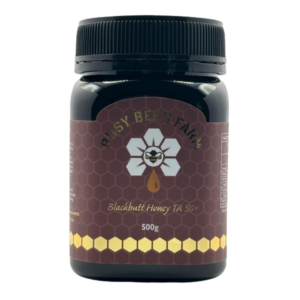
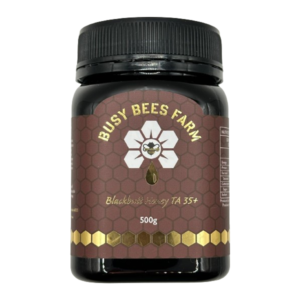



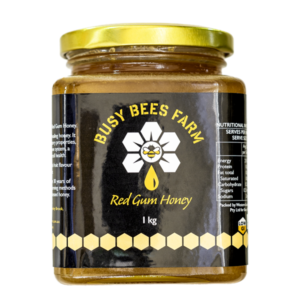

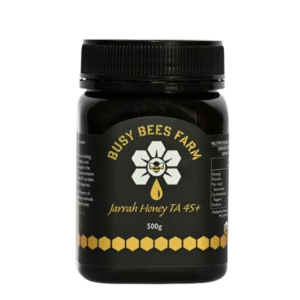

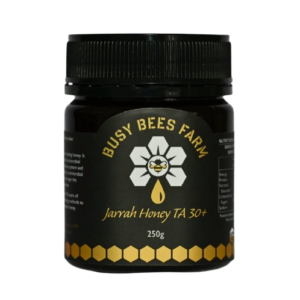
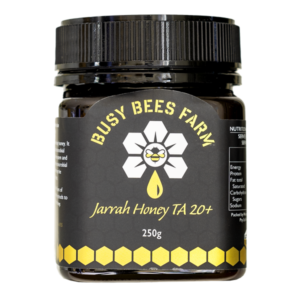

Copyright© 2024 Busy Bees Farm / Australia